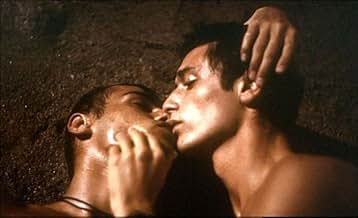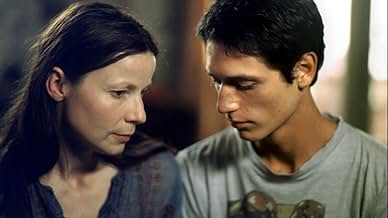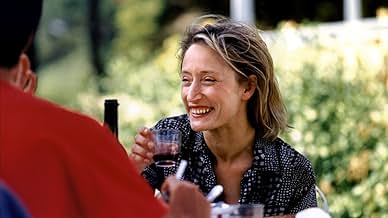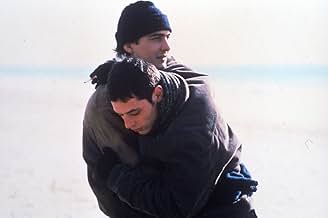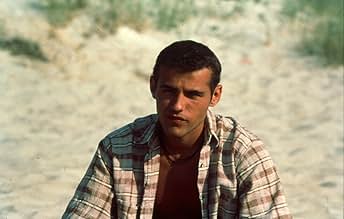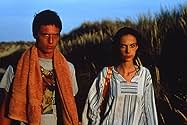Mathieu, de 18 años, pasa el verano en la casa de verano de su madre, en Bretaña. En la playa, conoce a Cédric, un chico de su edad. Empieza una historia de amor entre los dos chicos.Mathieu, de 18 años, pasa el verano en la casa de verano de su madre, en Bretaña. En la playa, conoce a Cédric, un chico de su edad. Empieza una historia de amor entre los dos chicos.Mathieu, de 18 años, pasa el verano en la casa de verano de su madre, en Bretaña. En la playa, conoce a Cédric, un chico de su edad. Empieza una historia de amor entre los dos chicos.
- Dirección
- Guionistas
- Elenco
- Premios
- 1 nominación en total
- Mathieu
- (as Jeremie Elkaïm)
- Cédric
- (as Stephane Rideau)
- La psychiatre
- (as Rejane Kerdaffrec)
Opiniones destacadas
Mathieu (handsome and gifted Jérémie Elkaïm) is visiting the seaside for a holiday, a time to allow his mother (Dominique Reymond) to struggle with her undefined illness, cared for by the worldly and wise Annick (Marie Matheron) and accompanied by his sister Sarah (Laetitia Legrix): their distant father has remained at home for business reasons. Weaving in and out of the first moments of the film are images of Mathieu alone, looking depressed, riding trains, speaking to someone in a little recorder. We are left to wonder whether the unfolding action is all memory or contemporary action.
While sunning at the beach Mathieu notices a handsome youth his age starring at him, and we can feel Mathieu's emotions quivering with confusion. The youth Cédric (Stéphane Rideau) follows Mathieu and his sister home, continuing the mystery of attraction. Soon Cédric approaches Mathieu and a gentle introduction leads to a kiss that begins a passionate love obsession. Mathieu is terrified of the direction he is taking, rebuffs Cédric's public approaches, but continues to seek him out for consignations. The two young men are fully in the throes of being in love and the enactment of the physical aspect of this relationship, so very necessary to understanding this story, is shared with the audience in some very erotic and sensual scenes. Yet as the summer wears on Mathieu, a committed student, realizes that Cédric is a drifter working in a condiment stand at a carnival. It becomes apparent that Cédric is the Dionysian partner while Mathieu is the Apollonian one: in a telling time in architectural ruin Mathieu is excited by the beauty of the history and space while Cédric is only interested in the place as a new hideaway for lovemaking.
Mathieu is a complex person, coping with his familial ties strained by critical illness and a non-present father, a fear of his burgeoning sexuality, and his nascent passion for Cédric. Their moments of joy are disrupted by Cédric's admission of infidelity and Mathieu's inability to cope with that issue and eventually they part ways. Time passes, family changes are made, and Mathieu drifts into depression including a suicide attempt. The manner in which Mathieu copes with all of these challenges and finds solace, strangely enough, in one of Cédric's past lovers Pierre (Nils Ohlund) brings the film to an ambiguous yet wholly successful climax.
After viewing the film the feeling of identification with these characters is so strong that the desire to start the film from the beginning now with the knowledge of the complete story is powerful. Lifshitz has given us a film of meditation with passion, conflicts with passion's powers found in love, and a quiet film of silences and reveries that are incomparably beautiful. The entire cast is superb and the direction is gentle and provocative. Lifshitz is most assuredly one of the bright lights of film-making. In French with English subtitles. Highly Recommended. Grady Harp
Told by director Sebastian Lifshitz and writers Stephane Bouquet and Lifshitz through a series of vignettes--often presented in a nonsequential timeline--the unfoldment provides some work on the part of the viewer to position these disjointed fragments together.
However, the basic scenario is so simple that the unfoldment does unite in post-reflection. It is an interesting tale, made plausible by two fine performances by the leads.
Jeremie Elkaim as Matthiew evokes a slightly moody, troubled youth, longing for affection, and willing to give of himself in a new relationship. Elkaim's work beautifully conveys Matthiew's need for companionship and for escape from a staid and mundane domestic environment.
Stephane Rideau presents yet another of his remarkable performances as Cedric. Rideau immerses himself in the role so skillfully that his craft brilliance is taken for granted. As close to the late James Dean as has been seen recently, Rideau takes his place in the Alain Delon legacy as one of France's leading young actors. Rideau possesses an arresting countenance: even his pointed ears, protruding chin, an off-centered eye, and crooked lips seem to contribute to his handsomeness. His Cedric is non-intellectual, expressing primitive emotions in his approach to life; yet, his ardor for Matthiew rings undeniably genuine and true.
The rest of the cast of "Presque rien" contribute to this slice-of-life tale, and we are pleased to have an opportunity to glimpse fragments of a both playful and poignant summertime romance.
(USA: Come Undone /UK: Almost Nothing)
Aspect ratio: 1.85:1
Sound format: Dolby Digital
While visiting his sick mother in Brittany during summer recess, a teenage boy (Jérémie Elkaïm) falls in love with a local youth (Stéphane Rideau), but their relationship falters as Elkaïm is cut adrift from all that was once familiar to him, with near-tragic consequences.
Sébastien Lifshitz's intimate drama chronicles the sexual awakening of a naive teenager over the course of an idyllic summer, recounted in piecemeal fashion as the director cuts abruptly between timeframes, from Elkaïm and Rideau's love affair to the former's subsequent hospitalization following an off-screen suicide attempt, rendered 'naturalistic' by hand-held camera-work and some improvized dialogue exchanges in key scenes. The results are confusing, to say the least: Just as the boys begin to strike out from their families and forge a life for themselves, Elkaïm slips into depression (why?) and appears to reject Rideau (why?), after which he goes looking for him again, only to find solace in unexpected quarters.
Anyone hoping for a rose-tinted love story will come away feeling more than a little disappointed, though Lifshitz refuses to compromise the sexual aspects of his own screenplay (co-written with Stéphane Bouqet): Elkaïm and Rideau are completely nude in several sequences, and there's a memorable, full-on sex session amongst the sand dunes which should satisfy all but the most ardent porn-watcher. But the boys' attachment is complicated by their relationship with their respective families, especially Elkaïm, who feels unable to declare his burgeoning sexuality because of a recent tragedy which has driven his father away and confined his mother to her sick-bed. Sad, complex and not a little frustrating, the movie works its magic in quiet ways, but it's a little too cold and dispassionate to satisfy all tastes.
Nicely produced on a modest budget, the film also stars Dominique Reymond, Marie Matheron and Laetitia Legrix as the three women in Elkaïm's life (mother, aunt and sister, respectively), along with Nils Ohlund as one of Rideau's former boyfriends, who figures heavily in the narrative's closing stages. The two leads are fine in difficult roles, and both have become iconic figures in European gay cinema: Rideau starred in such well-regarded Queer movies as WILD REEDS (1994), FULL SPEED (1996), TRANSFIXED (1997), SITCOM (1998) and THREE DANCING SLAVES (2003), while Elkaïm - who looks like a Bel Ami porn beauty - also appears in the gay-themed drama YOU'LL GET OVER IT (2002) as the love object of handsome Julien Baumgartner (SEXY BOYS). Director Lifshitz made his feature debut with the French TV production LES TERRES FROIDES (1999) following a series of short films with Queer themes, and his latest entry is WILD SIDE (2004), another perceptive exploration of omnisexual angst.
(French dialogue)
¿Sabías que…?
- TriviaJérémie Elkaïm was 21 years old and Stéphane Rideau was 23 years old when they played the teenagers 'Mathieu' and 'Cédric'. Elkaïm would later play yet another gay teenage character in the series 'À cause d'un garçon (2002)' and Rideau would play the aging hustler 'Vassili' in 'Notre paradis (2011)'.
- Citas
Cédric: [at the beach] Hey, Mathieu.
Mathieu: Please go away.
Cédric: Why?
Mathieu: So they don't see us together.
Cédric: Are you ashamed or what?
Mathieu: No, I just don't want any trouble.
Cédric: What trouble?
Mathieu: Can't you just leave?
Cédric: You think I'm stupid?
Mathieu: Just fuck off!
Cédric: What, fuck off?
- Bandas sonorasWise Mans Blues
Written by Perry Blake and Glenn Garrett
Performed by Perry Blake
From Perry Blake's album "Still Life"
Courtesy of Sony - ATV Music Publishing France
Selecciones populares
- How long is Come Undone?Con tecnología de Alexa
Detalles
Taquilla
- Total en EE. UU. y Canadá
- USD 326,484
- Total a nivel mundial
- USD 326,484
- Tiempo de ejecución1 hora 40 minutos
- Color
- Mezcla de sonido
- Relación de aspecto
- 1.85 : 1


